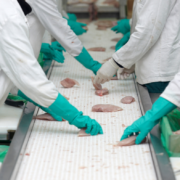NCL raises alarm over meat industry push to dismantle protections amid worker and environmental concerns
Media Contact: Lisa McDonald, Vice President of Communications, 202-207-2829
Washington, DC – The National Consumers League (NCL) is raising serious concerns over recent lobbying efforts by the Meat Institute, which is urging the Trump administration to roll back essential regulations designed to protect workers, the environment, and consumers in the meatpacking and factory farm industries. NCL’s concerns are heightened by disturbing reports of widespread hazardous child labor in the industry, including children working night shifts to clean factories with caustic chemicals.
In its letter to the White House, the Meat Institute is pushing for the elimination of critical protections such as the Clean Water Act, food safety regulations, and farmworker protections under the Packers and Stockyards Act. NCL is opposed to these efforts, warning that weakening these protections will lead to further exploitation of workers and unsafe food production practices.
“The history of the meat industry is a stark reminder of why these protections exist,” said NCL CEO Sally Greenberg. “The horrifying conditions Upton Sinclair exposed in The Jungle led to critical reforms such as the Federal Meat Inspection Act and the Pure Food and Drug Act in 1906—laws that NCL championed that continue to safeguard public health and ensure the safety of our food supply. We cannot afford to go backward.”
The emergence of widespread child labor in the meatpacking industry, with children working in hazardous conditions, echoes the dark past that led to these crucial regulations. The Meat Institute’s push to dismantle regulations on food safety, water pollution, and worker protections will not only harm workers, but also put consumers at risk. Without these safeguards, the public could face unsafe food products, environmental damage, and the continued exploitation of vulnerable workers.
###
About the National Consumers League (NCL)
The National Consumers League, founded in 1899, is America’s pioneer consumer organization. Our mission is to protect and promote social and economic justice for consumers and workers in the United States and abroad. For more information, visit www.nclnet.org.

















